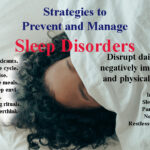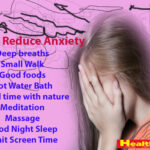How to overcome Sleep deprivation? Nap, reduce exposure to sunlight, avoid smart phone and Late-night working, have a warm shower, listen to soothing music, meditate and visualize a happy memory
Sleep deprivation can cause a drastic toll on the human body. It not only has mental and physical effects on ourselves, but in many ways it can negatively affect the lives of other people. Being aware of a healthy amount of sleep and ways to control a person’s sleeping habits are necessary for living a long and healthy life.
How dangerous are the effects of sleep deprivation? In some cases, it might be deadly. During the 2014 edition of the FIFA World Cup a young Chinese man lost his life after he probably died of sleep deprivation after spending nights awake watching tournament games for 48 hours straight. During Euro 2012, another Chinese man stayed up to watch the whole thing in one sitting. After 11 days, Jiang Xiaoshan also succumbed to death from exhaustion, suggesting that, even if you love soccer, you probably shouldn’t watch it nonstop for over a week.


The Centre for Disease Control and Prevention (CDC) marks insufficient sleep as a public health problem. The CDC states that sleep insufficiency links to health problems. Inadequate sleep can lead to physical and mental health problems such as injuries, motor vehicle accidents, industrial accidents, occupational errors, loss of productivity and even a risk of death due to diseases like high blood pressure. Premature ageing, diabetes and anxiety disorders are also some other problems associated with less sleep.
The signs and symptoms of sleep deficiency may differ between children and adults. Children who are sleeping short might be hyperactive and show problems paying attention.
Elements of Sleep hygiene
- Napping was found to be both physiologically and psychologically beneficial to sleep deficient people. Napping for 20 minutes can help refresh the mind, improve overall alertness, boost mood and increase productivity.
- Reduce exposure to sunlight by making the room dark and noise-free with heavy drapes to sleep soundly.
- Emails, social networking, web browsing are addictive and also alert the mind. Avoid these just before sleeping hours.
- Don’t sleep with the smart phone in your bed.
- Late-night movies and partying, often at the cost of sleep, leaving us exhausted. Don’t schedule late nights on weekdays.
- Have a warm shower, listen to soothing music, meditate and visualize a happy memory, so that you go to bed feeling positive and calm good for sleep and for life itself.


Dr Sachin Kumar
MBBS, MD, DM, FCCP
Senior Consultant – Pulmonology
Sakra World Hospital
Bengaluru-560 103
Ph: 08049694969











